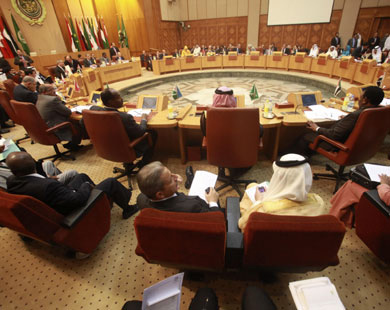Azerbaijan, Baku, June 8 / Trend U.Sadikhova /
Leaving the Arab peace initiative to resolve the conflict with Israel is not in the interest of the Arab countries' policy in the region, experts say.
"Withdrawal from the Arab peace initiative will put Arab countries, especially major countries such as Saudi Arabia or Egypt, in a difficult position," Expert on Palestinian affairs at the Egyptian Research Center Al-Ahram Abd Ali Mohammed told Trend.
There are reasons for the peace process with Israel until the Arab initiative exists and operates, otherwise, the Arab states will face the challenge of finding alternatives to this document, Mohammad said.
The Arab countries have opened the discussion to revoke peace initiative, which has not been approved by Israel for eight years, following Israel's attacks on the international humanitarian " flotilla of freedom ", which had citizens of 32 countries on board. The Arab countries disagreed on the matter: some of them, for example Kuwait, decided to withdraw from the initiative, while others opposed cancellation of the document.
Egyptian Foreign Minister Ahmed Abu Gheit regards withdrawal from the initiative as a step out of the desire to create a Palestinian government. He said regional peace is impossible without the implementation of the provisions set in this initiative, RIA Novosti rwported.
"The initiative reflects the vision of how peace can be achieved in the Middle East," Gheit added.
The peace initiative proposed by Saudi King Abdullah bin Abdul Aziz was adopted at the all-Arab summit in Beirut in 2002. It provides the establishment of Arab countries' relations with Israel, if the Jewish state liberates the occupied territories and recognizes the proclamation of an independent Palestinian state.
Experts believe that the Arab states, especially the key players in the peace process, will not go to a full review of document, as they may face a number of difficulties.
Professor at the Lebanese University Talal Atrisi, the Arab States, in the event of failure of the initiative and recognition of its failure, would have to look for ways to replace it, which means that they will have to consider ways alternative to the peace process towards resolving the conflict. It may also mean support for armed resistance against Israel, Atrisi said.
"In this case the Arab states will have to rely on the [armed] resistance, which is not in their interest," Atrisi told Trend over telephone.
It considers the statement of Arab countries rather as a hint to Israel, rather than a warning, but the leading states of the region - such as Egypt, Jordan and Saudi Arabia are not ready to support the proposal.
Last week, foreign ministers of Arab countries at an extraordinary meeting in Cairo did not withdraw the peace initiative, making the leaders of states responsible for this matter.
Egyptian political scientist Ali Muhammad believes that the refusal of the Arab peace initiative will put Arab leaders before a difficult choice: either go for a military solution of the conflict, either to wait or accept the status quo, that is to recognize the occupation of Palestinian territories by Israel.
So until the Arab states will not have a suitable alternative, they are unlikely to refuse to support the peace initiative.
According to the British analyst on the peace process in the Middle East Kirsten Schulze, differences on positions of Arab countries in preserving the peace initiative on the negotiating table is due to the fact that not all Arab countries played a key role in the peace process.
"İt depends on the country. Egypt does not agree, because it was a key mediator in the peace process since 1993. But countries such as Kuwait has never been the focus of peace negotiations, so as easily took this decision", Schulze, senior Lecturer at the Department of International History of London School of Economics and Political Science told Trend.
Azerbaijan orientalist Fikret Sadikhov believes that withdrawal of one of the Arab countries from the peace initiative does not mean complete failure of the document. But at the same time, the political scientist doubts the effectiveness of this initiative to resolve one of the long-lasting conflicts in the Middle East.
"I do not think that this document is of great political significance. Many years of unresolved conflict indicates that the document may even be preserved, but the importance and relevance lies in the fact what will follow after this in practical terms, what the implementation of the tasks indicated in connection with this initiative will be. Therefore, the initiative will continue, but it will not be effective," Sadikhov toldTrend.






